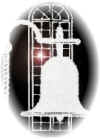|
|
John 10: 27-30 May 3, 1998 Being Christian basically means knowing, loving, and following Jesus Christ. It is through the Holy Spirit in the People of God that Christians come to know Jesus Christ, their Risen Lord. In the Spirit their relationship to him grows and matures through Sacred Scripture, the teaching of the Church, the graced life of the Christian Community, and prayer. In the poor and the oppressed, Jesus Christ is specially present, for it was he who said, "Whatever you do to one of these the least of my sisters and brothers that you do to me." In our Gospel for this day, Jesus presents himself as a Shepherd. In contrast with the shepherds of Israel who neglected their sheep (cf. Ezek. 34), he is the Good Shepherd who gathers them together and feeds them. He lays down his life for them. He gives them eternal life. In him, they will not perish. His sheep hear his voice. He knows them. They follow him. (Cf. John 10: 27-28). Described is a relationship of mutual familiarity between the Shepherd and the sheep. The Shepherd knows each sheep by name. The sheep recognize his voice. It is a description of the relationship between our Lord and ourselves in our often menacing world. He is our Shepherd, we are his sheep. He is with us. He leads us to green pastures. He protects us against the wolves. He lays down his life for us. He knows each of us by name. Hence, we know him. We recognize his voice. We follow him. In this period of local and national elections in our country, it is the Lord’s voice that we must listen for in the Babylon of voices competing for our votes. Some are voices of the poor, others are voices of performance. Some are voices of law and order, others are voices of the rural disadvantaged. Some are voices of global competitiveness, others are voices of the oppressed: women, the urban poor, the rural poor. In this Babylon of voices, where some voices articulate truth, others lies, some voices are genuine, others fake, it is the Lord’s quiet voice that we must listen for, and recognize. It is this voice, sought in deliberate prayer and heard in prayerful deliberation, that must guide our free choices for public office. Our Shepherd lays down his life for us, lest we be devoured by wolves. He speaks, lest we be led astray by false shepherds. We have had deep and painful experience of false shepherds who have killed the sheep and plundered our nation. We have had deep and painful experience of shepherds who pretend to be paragons of moral statesmanship but are in fact disasters of personal integrity. We have had humiliating experiences of shepherds who have falsified election results and robbed the people of the leaders of their choice. These are wolves in shepherd’s robes. In prayer, we must beg for the grace of discernment, that we might hear the voice of the Good Shepherd, and follow. As rumors of probable cheating and electoral fraud become rife, we must listen once again for the voice of the Good Shepherd. Certainly, his voice does not counsel complacency and indifference; his voice counsels respect for and defense of the Truth. Urged by the Good Shepherd, we have to commit ourselves anew to electoral Truth, as Filipinos and Filipinas before us committed themselves. Commitment to Truth was when the Comelec computer technicians walked out of the tabulation centers rather than be party to wholesale electoral fraud under President Marcos; commitment to Truth was when religious sisters put their lives on the line hugging the ballot boxes of the people, rather than yield the people’s will to the forces of evil and darkness. It is the voice of the Good Shepherd today that urges us all to renewed commitment to Truth. The Good Shepherd knows us by name. He is concerned for our welfare. He speaks. Let us hear his voice. And come, follow him. |








 CHAPEL NET
CHAPEL NET